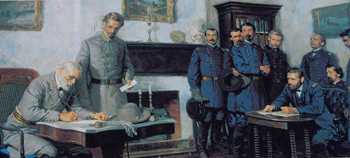By Stephen Douglas Wilson

Gen. Robert E. Lee arrived at the McLean House near Appomattox, Va., On April 9, 1865, to meet with Union commander Gen. Ulysses S. Grant (born Hiram Ulysses Grant).
Nearly surrounded and with an undernourished army, Lee sought generous surrender terms from the Union army leader whose wartime nickname was “Unconditional Surrender Grant.” Both men knew that what they decided on here would set the tone for the nation after the grueling four-year Civil War.
The two men grew up in a United States that embraced a strong Christian worldview.
General Lee was a practicing Christian for most of his life and was confirmed in his Episcopal faith. He carried around a worn-out prayer book during the Civil War that was only replaced when he could no longer read the small print. He had freed his own slaves long before the war, retaining one of his freed slaves as his paid servant and confidant. Lee’s personal compassion for others as both a private citizen and an army commander was legendary. In addition, he later confessed to other Southerners after the war that he had prayed for his enemies during the conflict.

The faith of General Grant is harder to discern. At West Point, a youthful Grant revealed to others that he disliked attending chapel services. He was not a regular churchgoer, but did so occasionally at the request of his devout wife. Grant never publicly made his faith convictions known, although the Methodist pastor of his wife said that Grant had confessed Christ before his death. Grant eventually confessed to resigning his military commission prior to the Civil War in part because of drinking too much. After returning to the Army, his wartime record never included incidents of alcohol impacting his military performance, although the pre-war charge of insobriety resurfaced among his critics. Nevertheless, his memoirs reveal his Christian worldview and a desire to live a moral life. After the war when Grant was president, he signed the bill that made Christmas an official federal holiday.
Lee, dressed in his best uniform, arrived at the McLean residence first and waited for Grant to arrive. In a previous correspondence, Grant magnanimously told Lee to pick the meeting place and that he would meet him there. Grant entered the house in a mud-spattered field uniform that revealed his haste to get there. The two men exchanged pleasantries and discussed their common military service in the Mexican War.
Surprisingly, Grant could not bear to bring up the subject of surrender. He later related he was genuinely saddened by the plight of his Confederate enemies. It was Lee who gently nudged the Union general into that discussion.
In what must be described as one of the most Christ-like moments in American history, Grant then proceeded to propose a very gentle settlement for his enemies of the last four years.
Grant offered to parole Lee’s enlisted men only on their word not to take up arms against the United States ever again. Officers would have to sign a written parole vouching for their men. Enlisted men would have to give up their arms, but officers could keep their sidearms, horses and private property. Then the Union commander said each man could return home without fear of being imprisoned or prosecuted for treason.
In a brief discussion, Lee convinced Grant to let enlisted men keep the horses and mules they possessed to assist them in planting crops for that spring. Arrangements also were made for the hungry Confederates to be fed from Union storehouses. Lee, who realized that Grant’s terms were better than he had expected, conveyed his gratitude by saying to Grant, “This will have a very happy effect among the men and do much toward reconciling the country.”
Both men then shook hands and left. Lee rode back to Confederate lines; when Grant emerged from the McLean residence, Union troops began cheering, but the general rebuked them. “The Confederates are now our countrymen, and we do not want to exult over their downfall.”
Three days later, Lee’s entire army formally surrendered without incident. Each army showed the proper respect to each other; there is no record of a single Union soldier cheering for their victory or jeering their Confederate counterparts. Within two-and-a-half months, all other Confederate armies would surrender in like fashion. The Civil War was over.
For the rest of their lives, both Lee and Grant possessed a great respect for each other. Grant never spoke ill of Lee and later prevented federal authorities from charging Lee with treason as that would have violated the letter and spirit of the Appomattox peace.
Lee long remembered Grant’s generosity at Appomattox. Years later when a college faculty member at Washington College where Lee was the president spoke ill of Grant within hearing distance, Lee interjected, “Sir, if you dare presume to speak anything disrespectful of General Grant in my presence again, either you or I will sever your connection with this university.”
The spirit of Christ certainly had prevailed on that April day at Appomattox. It was on a Palm Sunday. As noted by an American historian, the men of both armies would all live to see Easter. — Baptist Press



